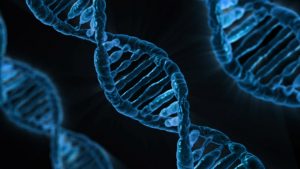Cancer most commonly is defined as a “perpetuating mass of dystregulated cells growing in an uncontrolled manner”, however the meaning can be further related to epigenetics, for they appear to be very much interconnected. Another definition of cancer goes on to note this relationship as the “dynamic genetic and epigenetic alterations that contribute to cancer initiation and progress.” Recent research shows that if epigenetics is disrupted, it might switch to oncogenes or shut down tumor suppressors. Either way, this would lead to the development of tumor cells that would cause cancer. We are already aware of the fact that chemical modification affecting the packaging of our DNA can switch genes on and off. The first time that became aware of an epigenetic code, we learned that that code chemically labels active or inactive genetic information. The focus of epigenetics is on the change caused by the modification of gene expression, not the alteration of the code itself. With recent discoveries through research on epigenetics and its relation to cancer, we learned that there must be a balance of “writers” and “erasers” for the cells. Recent data has shown that methyltransferase EZH2 is an epigenetic writer that is hyperactivated in many cancers, specifically melanomas and lymphomas. This recent research also shows KDM3A (member of the jumonji histone lysine demthylase family) as an epigenetic eraser. KDM3A fulfills an oncogenic role by activating a network of tumor promoting genes. Epigonomic changes also allow tumor cells to evade the immune system so that these cells can thrive and divide without the disruption of the immune system. Ultimately, there are two potential pathways that epigenomic regulators can cause cancer. The first is the result of too much epigenetic activation, which can lead to oncogenes. The second is too much epigenetic protection that conversely blocks tumor suppressor genes. DNA hypermethylation causes the silencing of tumor suppressor genes.
Both of these methods would lead to the development of cancer. Epigenetic regulation involves methods including histone regulation, DNA methylation, and changes in noncoding RNAs such as miRNAs. One of the challenges of studying cancer and researching possible vulnverabilities in pathways is that they are often disrupted by epigenetics. The recent studies also have shown that there are close ties between epigenomic (analysis of global epigenetic changes across many genes) changes and metabolites, or human cellular chemistry. Metabolites initiate, target, or maintain epigenetic factors with the transcriptional complex, and cooperation with them metabolites can target, amplify or mute these coded responses. Since the fields of both epigenetics and metabolism are still developing a great deal, there is hope that these insights with regards to cancer and regulating gene expression to prevent the development of cancer will allow for more precision in targeting cancer, specifically when existing methods of therapy fail to work sufficiently.


Leave a Reply